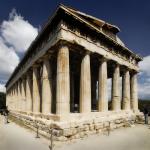|
This section contains 924 words (approx. 4 pages at 300 words per page) |

|
Solon. Despite the rise in economic well-being and the growth of nonagricultural jobs during the Archaic Period (700-480 B.C.E.), there is no indication of the advent of a new social class based on the newer occupations provided by manufacture and commerce. Agriculture remained the foundation of the economy, a fact confirmed by the work of the Athenian legislator and reformer Solon, who, in dividing the population of Attica into four classes, used as his criterion the amount that a citizen's land could produce.
Land Problems. The appearances of Solon and of his legislation on the historical stage were due to a crisis that occurred in some places during the last century of the Archaic Period. The origin and development of the crisis and the solution to the problems it created cannot be followed with...
|
This section contains 924 words (approx. 4 pages at 300 words per page) |

|




